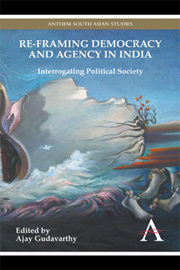Book contents
- Frontmatter
- Contents
- Preface and Acknowledgements
- List of Tables
- Chapter 1 Introduction: Why Interrogate Political Society?
- Part I Political Society and Protest Politics
- Part II Political Society, Middlemen and Mobility
- Chapter 7 The Pyraveekar: The ‘Fixer’ in Rural India
- Chapter 8 Politics of Middlemen and Political Society
- Chapter 9 Widows' Organizations in Kerala State, India: Seeking Citizenship amidst the Decline of Political Society
- Part III Civil Society and/or Political Society
- Part IV Rejoinder
- List of Contributors
Chapter 9 - Widows' Organizations in Kerala State, India: Seeking Citizenship amidst the Decline of Political Society
from Part II - Political Society, Middlemen and Mobility
Published online by Cambridge University Press: 05 June 2012
- Frontmatter
- Contents
- Preface and Acknowledgements
- List of Tables
- Chapter 1 Introduction: Why Interrogate Political Society?
- Part I Political Society and Protest Politics
- Part II Political Society, Middlemen and Mobility
- Chapter 7 The Pyraveekar: The ‘Fixer’ in Rural India
- Chapter 8 Politics of Middlemen and Political Society
- Chapter 9 Widows' Organizations in Kerala State, India: Seeking Citizenship amidst the Decline of Political Society
- Part III Civil Society and/or Political Society
- Part IV Rejoinder
- List of Contributors
Summary
Introduction
The state of Kerala, located in the extreme southwest of the Indian subcontinent, has been an object of social and scientific interest for primarily two reasons. First, Kerala's politics, specifically, the dominance of the communists in the mid-twentieth century, attracted the attention of political scientists, who treated it as a laboratory of communist politics within the broader liberal-parliamentary framework of India (Jeffrey 2003). Secondly, Kerala's remarkable achievements in social development have led to a debate around the ‘Kerala Model’ since the mid-1970s. The state is marked by high literacy rates for both men and women, low birth, death, and infant mortality rates comparable to developed countries, a female-favourable sex ratio, and other positive social features, which are widely accepted to be an outcome of militant politics foregrounding ‘public action’ (Parayil 2000). Historically, the ‘political turbulence’ attributed to mid-twentieth century Kerala was offset by the continuous expansion of state welfare – a combination of policies for food security, land reform, improvements in educational and healthcare facilities, and social security. Under conditions of a strong Left hegemony, welfare was clearly pegged to a notion of people's collective rights as an instrument of upward mobility from poverty. The centrality of ‘public politics’ was unmistakable – the widespread participation of the masses in politics and their functioning as a keen and demanding electorate that drove ‘Kerala politicians to pursue programs in education, land reform and health that foster perceptible improvement in people's lives’ (Jeffrey 2003, 10).
- Type
- Chapter
- Information
- Re-framing Democracy and Agency in IndiaInterrogating Political Society, pp. 201 - 232Publisher: Anthem PressPrint publication year: 2012



